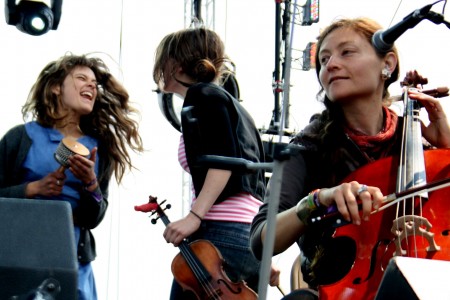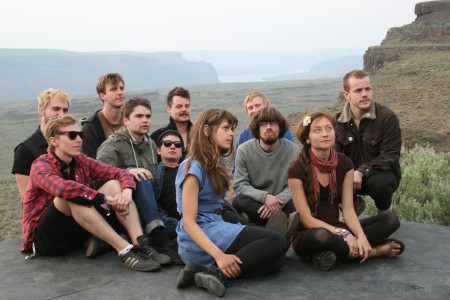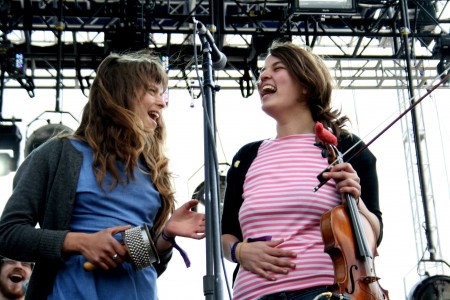“the songs of sickness can become the songs of healing” :: the Typhoon interview

The music of Typhoon is big and connective and incisive; it’s thematically smart and expansive. This Portland band resides together in a big Victorian house (sketched on the cover of their latest EP), and perhaps it’s just because I live in a cohousing community myself, but the resonance of this arrangement radiates audibly in the wooly coziness of their music. Some months ago, I got to see Typhoon live for the first time — an event I welcomed with intense anticipation of the joy to come. I had watched videos of their live spectacle, all thirteen band members, and when the day came I was all over it.
Thirteen people may seem superfluous (especially touring – they are coming to my house next week. I’m still debating where to stash them all), but when you see them onstage, you realize that everyone has their own hue and shade to fill into the song – three brass players, three drummers, two guitarists, one on keys/bells, a bassist, a violinist, and a cellist at least were what I counted when I saw them in Washington. It’s pretty damn incredibly lovely.
The arc of the songs and the threads woven across albums fascinate me. I could tell the first time I listened that this music was crafted by a songwriter who gave uncommon care to the big picture, in all the shades. That primary songwriter is Kyle Morton, and I got to sit for a while with him and explore these broad brushstrokes in his music, how he sees the songs in his head and projects them outwards for the band to fill in, and how his struggles with chronic illness growing up have molded his music. It was a fascinating conversation that I am thrilled to finally share with you.
FUEL/FRIENDS INTERVIEW: KYLE MORTON OF TYPHOON

Fuel/Friends: So with thirteen people, how does the songwriting process take shape into something coherent and harmonious?
Kyle: I do most all of the writing, and more and more it’s becoming the band doing the arrangements. With the new EP, there was definitely more band involvement with the arrangement than we’d had before. You can hear it on this record, and when I listen back to Hunger and Thirst now — it’s much sparser. I do like that, but on the new EP if you listen to the tracks, there are so many more times when we’re playing all together, pockets of all the band coming in together, utilizing all of us.
In my writing, when I look at songs, I look at them in terms of the whole piece, and even the albums themselves are part of the whole piece, so I hope that all of our albums, taken together, can be looked at as kind of a continuous body of work. Like, for instance, one of the songs off of the new EP is actually a really old song, “Claws Pt 1,” and “CPR – Claws Pt 2” is on the older album. I wrote it before but it was released after because it made sense. There are definitely those connections across records. In my brain I want our music to be something coherent, at least coherent to me — to be coherent in me.
So a lot of themes are going to come back on the next record, I think, and they’ll always be there. On the one hand, maybe that might seem unoriginal, to keep recycling the same shit over and over again, but I also think novelty is overrated, and I think coherence is undervalued.
It seems to be a nod to the listener, almost, in an era where a lot of times it’s just one or two songs people will have heard from you, it’s a way of rewarding people who take the time to listen to it as a full arc.
Yeah, it may not seem like much, but I think that requires a pretty good attention span these days, like there’s a “Typhoon theme” on the horns that we use in a few different places, and it’s gonna come back around – you can hear it, we snuck it in at the very end of this song called “Happy People” on Hunger and Thirst, and it’s on a new song we working on as well. Nods like that.
I also hear a fascinating and affecting theme of mortality and human frailty throughout your records, specifically on songs like “The Sickness Unto Death” and “Summer Home” that seem to explore your struggle with Lyme disease and the bug that bit you. What are some ways that struggle has informed, or not informed, your songwriting?
I wrote that song “The Sickness Unto Death” not only about me, and my “death,” but I’d also been reading the Danish philosopher Soren Kierkegaard, and he wrote his book The Sickness Unto Death, which I plagiarized the title from. And maybe songs aren’t the right …form for those kinds of ponderings, but that’s the only thing I’m interested in writing about. With music, it’s a very interesting synthesis for me – especially trying to make the themes in the instrumentals reflect the themes in the words. It’s difficult.
Even going back to Greek philosophy, and this idea that as you get older, you start to lose your desires, which can be a good thing and a bad thing, this losing of desires for sex, or for food, because all those things are causing you pain. But I imagine, because on the other hand I see a lot of bad coming from people’s desires, and desire itself being kind of an interesting point. So that’s why I have an album called Hunger and Thirst, meditations on why we want to be anything.
When I started realizing all the things I wanted to do with my life, I didn’t want them, I just imagined wanting to be this person who was doing those things. And then I got sick [with Lyme disease], and it kind of ruined all those plans I had and I had to adapt, and it caused a lot of bitterness in me for a long time. It still does. I never grew tall, I never had the childhood that you’re supposed to have, without pain. But then maybe you don’t –maybe no one has that.
Letting go of the idea of what we thought we were promised?
Yeah. All these promises, they’re tenuous. On this last record, on the song “Summer Home,” and in lots of songs, you will see that reference to a bug that bit me, which is just –this beast, you know? This thing that affects your life, and never even seeing it. It’s almost not even the tick itself. It’s the implications of it. It becomes a symbol. It’s when you first realize that some of these promises you have, assume or take for granted that you deserve it, and that’s a pretty sobering moment.
I think “The Sickness Unto Death” does feel, at the end, like a quiet and dark place of death, but then there is also definitely, as a listener, this feeling of rebirth as it swells and explodes into “The Honest Truth,” which is like the next step – at least in my mind.
Yeah, I’ve been trying to research this for a long time, but music — I imagine its early roots being tied and intertwined with early religion. And nowadays, the world is such a secular place, but we still have music, and it still has something sacred about it. There’s glimmers out there.
Trying to capture that, I guess that’s the thing. There are a lot of problems, capturing that glimmer and then trying to share that with someone — and it changes. I don’t know how to reconcile any of that.

Do you write the songs with all the parts from all the band members in mind?
How that’s worked in the past –this is cool– I hear it in my head a certain way first – it plays itself all the way through, and with parts. But then when I try to express those to people, the way it comes out doesn’t sound exactly like what I hear in my head, but it sounds better, even. It’s like a weird projection of the inside my brain, which is not to say I’m just using all these people as a screen for what’s inside my brain, because they’re all – most of them are better musicians than me, technically speaking. But it’s just really lovely to get to hear everyone’s take on it.
So, it’s like they fill in the shading?
Yeah …and that’s the only way I’ll perform, I won’t perform by myself. That’s scary, and weird, and masochistic. But I really like performing with everybody. As opposed to being a performer, in front of people, I am much more comfortable reading, and writing — even though I wouldn’t make a very good writer, or philosopher. But music seems to work because it picks up in that place where rationality stops and the transcendent emotion that underlies all music, starts. At least, that’s what it’s always kind of done for me.
I am very self-conscious, and self-aware when I am onstage, of what a bizarre act it sometimes is. It’s also a really simple thing, though, this happiness – you’re not lonely when you have that many friends around. Typhoon used to be a lot less restrained, but not in a bad way. If you see videos of our old days, everyone kind of played everything, and there was a lot more extemporizing, but on the other hand I really like to see how we’re getting so much tighter. And hopefully we’re aware of the vanity of this whole thing, yet we’re still drawn to it – for hopefully the right reasons.
Maybe catharsis is best experienced with twelve other people on stage.
Yeah – you can’t even have that counterpoint unless you have the other members. There’s not the synthesis without the other people. In that way, with all of us up there, the songs of sickness can become the songs of healing.

Typhoon is playing all over SXSW this week, including headlining the awesome Colorado Reverb party that you should navigate yourself to at Dirty Dog Bar on Saturday.
Then as they traverse the great desert back up to the Pacific Northwest, they are coming through Colorado Springs for a gallery show that I will be hosting with our college radio station KRCC on Tuesday, March 20. Motopony opens, and it will all be terrifically wonderful. Please do join us.
You want to immerse yourself in this.



 Name: Heather Browne
Name: Heather Browne
Lovely interview, Heather! I’ve been mildly obsessed with this band for quite a while, and I’m excited that they’re putting new work out into the world soon. I’m incredibly jealous you’ll have the whole cavalcade crammed into your place — can’t wait to hear the result! Thanks again.
AngelHeadedHipster — March 13, 2012 @ 7:08 am
this is so, so good, and i love it all. have such a great time tomorrow!
Heather B — March 20, 2012 @ 12:39 am
Wow, this is a fantastic interview Heather. I always got the feeling the LP and the EP fit together, especially with the Claws tracks, as well as the “Hallelujah it will be gone soon, it’s just an empty room” lines on “Mouth of the Cave” and “The Honest Truth.” I like the melodies that “Summer Home” and “Firewood” share, too. Can’t wait to share this with my Typhoon obsessed friends.
-Wes
Wes Davenport — March 29, 2012 @ 12:58 pm
May be i am a late reader, but thanks for this article

This band is one among the best ever band i ever came across. I just wish them good luck through this blog post. *your guys are #awesome*
Keep up the good work
Allen! — March 12, 2014 @ 5:31 am